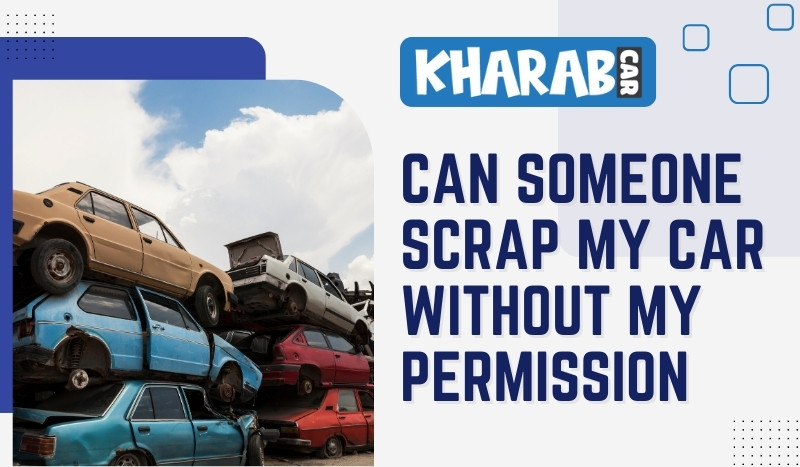- Barsha Heights - Dubai
- info@kharabcar.com
- +971 55 722 7700
Can Someone Scrap My Car Without My Permission?

Can Someone Scrap My Car Without My Permission?
The concept that an individual could scrap a car without the owner's consent presents significant ethical and legal issues. We at KharabCar.com will cover a wide range of topics in this in-depth article, including the laws governing car salvage, the repercussions of unlicensed vehicle disposal, and the precautions you may take to safeguard your ownership rights. By the time this is all over, you'll know exactly what rights you have and what you can do to make sure your car isn't scrapped without your permission.
Legal Ownership: Can My Car Be Scrapped Without My Consent?
Legal papers, usually in the form of a title or registration certificate, define who owns an automobile. This paperwork demonstrates that you are the car's legitimate owner. No reputable recycling facility or scrap yard should accept your car without it. Important information like your name, the make and model of the car, its identification number (VIN), and other identifying features are all included on the ownership paperwork.
Financial Ownership
If you have a loan or lease that finances your car, the lender has a lien on the vehicle until the loan is paid off in full or the lease terms are fulfilled. In these situations, you are not entirely free to decide whether to scrap your car without the lender's consent.
You need to show proof of ownership to lawfully scrap an automobile. The majority of jurisdictions want the title of the vehicle, identification documentation, and occasionally a bill of sale. This procedure guarantees the legal entitlement of the person authorizing the scrapping. Recycling facilities and scrap yards must adhere to tight regulations to prevent legal ramifications.
Requirements for Reporting
Car scrappage often requires reporting to the local motor vehicle authority. This is to guarantee that the car is legitimately taken off the road and that its registration is revoked. The owner of the car may be subject to fines and other penalties for failing to report.
Illegal Scrapping: Potential Legal Repercussions
Fraud and Theft
It is theft to sell a scrap car without the owner's consent. There are severe legal repercussions for the individual who did the unauthorized scrapping, including criminal prosecutions and civil litigation. Fraud is also involved, particularly if someone tries to scrap the car by presenting fictitious ownership documentation.
Accountability and Losses
You have the right to pursue damages for the loss of your property if your car is scrapped without your consent. This can include the car's market value, any personal items contained within, and any other damages that may have occurred. If the car was necessary for your everyday activities, you may also be able to make a claim for the loss of usage.
Preventing Unauthorised Vehicle Scrapping with Secure Documentation
All ownership paperwork should be kept in a secure location. Don't leave them in the car, where someone looking to conduct fraud may quickly get to them. Keeping copies of essential documents in a different location is also a smart idea.
Frequent Inspection
Check your car's status regularly with the local motor vehicle department. Verify that the registration status hasn't been altered without authorization. This can assist you in identifying any questionable conduct early on.
Anti-Theft Procedures
Equip your car with tracking systems and anti-theft gear. These can help recover your automobile if it is stolen and deter potential thieves. If someone moves your automobile without your consent, some sophisticated technologies can notify you.
Lawsuits
Call the police right away if you find out that your car has been scrapped without your consent. Give all the proof you need to back up your argument. To learn more about your rights for reimbursement, you could also get in touch with your insurance provider and seek legal advice.
Discarded and Stolen
After reporting their car as stolen, a car owner discovered that it had been scrapped. Due to their improper ownership document verification, the scrap yard was sued. The owner was successful in suing to get additional damages for mental distress in addition to the car's worth.
Family Member's Unauthorised Scrapping
In another instance, a family member sells my car without my permission. Following procedure, the scrap yard requested ownership documentation, but the family member produced falsified paperwork. The car's worth and legal bills were settled after the rightful owner filed a lawsuit against the family member and the scrap yard.
Preventive Actions for Verification Procedures at Scrap Yards
To make sure they are working with the legitimate owner, scrap car buyers need to implement strict verification procedures. This entails verifying the ownership through cross-referencing with official databases, confirming the title, and keeping copies of all paperwork on file for a predetermined amount of time.
Instruction and Knowledge
Regular training on the significance of confirming ownership documentation and identifying indicators of fraudulent conduct should be provided to scrap yard workers. Raising awareness through campaigns can lessen the likelihood of illegal or stolen autos being scrapped.
Law Compliance
When it comes to dismantling vehicles, scrap yards have to abide by municipal, state, and federal regulations. This entails reporting automobiles that have been scrapped to the relevant authorities and making sure that every transaction is clear and recorded.
Conclusion
There may be substantial legal, financial, and psychological ramifications if someone were to junk your car without your consent. You can safeguard yourself from unapproved scrapping by being aware of your rights as an automobile owner, adopting preventative measures, and being aware of the legal requirements that scrap yards must adhere to.
It is imperative to safeguard the paperwork of your car, keep a close eye on its condition, and promptly file a lawsuit if you discover any illegal activities. By doing this, you protect your assets and guarantee that your legal rights are respected.
